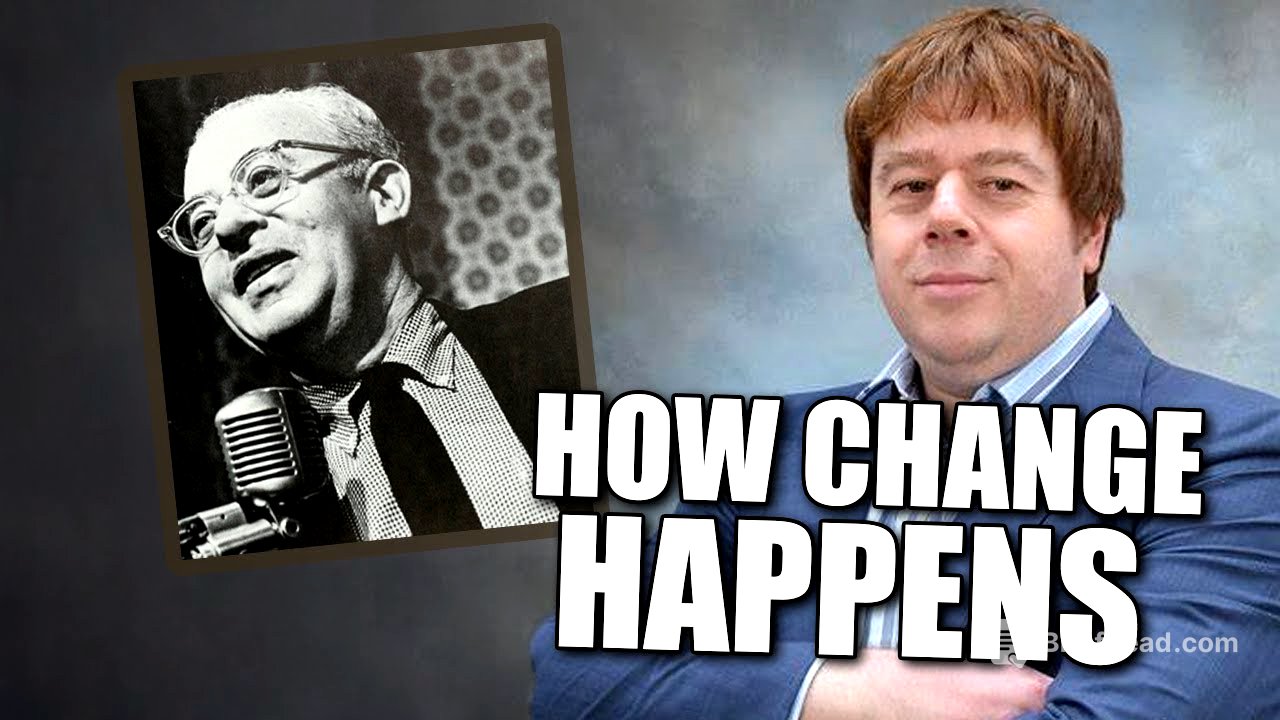TLDR;
Keith Weiner discusses how harmful ideas gain mainstream acceptance and power, despite most people not consciously supporting them. He highlights the Overton window, the regulatorium, and the erosion of key concepts like justice and freedom. Weiner argues that evil wins politically because it exploits altruism and envy, and because those who should oppose it often share the same basic principles or are afraid to speak out. He proposes a solution of creating numerous for-profit enterprises focused on specific areas where government infringes on liberty, offering practical solutions and building a strong market by focusing on single issues.
- The average person thinks that the average person is not on board with the current political mess, but in the right framing, virtually everyone supports aspects of the system.
- The Overton window limits debate to false alternatives, preventing real solutions from being discussed.
- Regulation, or the "regulatorium," adds friction, protects incumbents, and stifles innovation, yet is widely accepted.
- Evil wins politically by exploiting altruism and envy, and by those who should oppose it sharing the same basic principles.
- The solution is to create numerous for-profit enterprises focused on specific areas where government infringes on liberty.
Introduction [0:00]
Keith Weiner introduces the topic of how harmful ideas, like those espoused by figures such as Donald Trump and AOC, gain mainstream acceptance and political power. He notes the prevalence of a vast welfare state, financed by central banks, and the extensive regulation of productive enterprises. Weiner aims to analyse the social trends that have led to this point, drawing on the observations of Ayn Rand and highlighting the unexpected ways in which even objectivists sometimes support socialist agendas.
The Illusion of Unpopularity [2:58]
Weiner challenges the common belief that the current political mess is unpopular, arguing that, when framed correctly, most people support virtually every aspect of the system. He illustrates this with examples such as licensing for professions and regulations to protect against financial risks, pointing out that people often demand restrictions on businesses and productive activities. This widespread support, despite the apparent unpopularity of the overall system, is a key factor in how harmful ideas maintain their grip on society.
The Overton Window and False Alternatives [5:48]
Weiner introduces the concept of the Overton window, which defines the spectrum of ideas considered acceptable in public debate. He argues that society is often presented with false alternatives, such as government-mandated vaccinations versus government bans on vaccines, or central bank intervention to control inflation versus printing money to stimulate employment. These false choices limit the scope of discussion and prevent genuine solutions from being considered, trapping society within a narrow band of acceptable, but ultimately harmful, options.
The Road to Abilene and the Regulatorium [7:46]
Weiner uses the short story "The Road to Abilene" to illustrate how people can collectively agree to something that nobody actually wants, mirroring the current political system. He introduces the term "regulatorium" to describe the artificial and nonsensical environment created by excessive regulation. He points out the inconsistencies in regulations across different countries, using the example of electrical outlets in bathrooms, and argues that regulation is more about imposing costs and micromanaging decisions than about making sense or ensuring safety.
The Problem with Regulation [11:34]
Weiner elaborates on the problems with the regulatorium, highlighting that it makes no sense, doesn't create safety, and protects incumbents while stifling innovation. He notes that those who work within the regulatory system either benefit from it, like compliance officers, or are afraid to speak out against it due to potential repercussions. He uses the example of anti-money laundering regulations to illustrate how seemingly well-intentioned rules can be used to target and punish those who criticise the regulators.
Evil is Impotent, But Winning [15:26]
Weiner quotes Ayn Rand, stating that "evil is impotent and has no power but that which we let it extort from us." He acknowledges the apparent contradiction that evil seems to be winning, despite its inherent impotence. He clarifies that Rand meant evil is impotent over reality, but it is winning politically because more people are inclined to give evil people more power. This is not because evil is effective, but because the "good" is giving its sanction to the evil.
The Erosion of Principles [17:44]
Weiner explains that America's sense of life, which once acted as a bulwark against socialism, has been undermined because its principles were implicitly held rather than explicitly defined. He notes that the left has relentlessly pressured and redefined key words like "justice" and "freedom," eroding their original meanings. This constant pressure, combined with the lack of clearly defined principles on the other side, has allowed harmful ideas to gain traction and acceptance.
The Power of Consistency and Collaboration [25:12]
Weiner quotes another principle from Rand: "In any conflict between two men or two groups hold the same basic principles, it is the more consistent one who wins." He illustrates this with examples such as the Republicans and Democrats' shared acceptance of the welfare state, leading to its relentless expansion. He also discusses how collaboration between groups with different principles leads to the more evil and irrational side winning, as seen in the collaboration of libertarians with authoritarian figures.
National Socialism and the Confusion of Principles [29:18]
Weiner addresses the confusion surrounding national socialism, clarifying that it combines elements of both left-wing socialism and right-wing nationalism. He questions why objectivists, who should understand these principles, are collaborating with those holding opposite basic ideas, knowing that the evil side will win. He suggests that this is because they believe evil is powerful and therefore must be aligned with, or they redefine evil as good because it appears potent.
Saul Alinsky's Rules for Radicals [32:59]
Weiner discusses Saul Alinsky, a communist professor who taught radicals how to gain power. He highlights Alinsky's emphasis on power for the sake of power, and his book "Rules for Radicals." Weiner focuses on two key rules: "Make the enemy live up to his own book of rules," and "Pick the target, freeze it, personalize it, and polarize it." He explains how these tactics are used to accuse opponents of hypocrisy and to ridicule and demonise them, effectively shutting down debate and advancing a socialist agenda.
Altruism, Envy, and Ridicule [38:58]
Weiner argues that the acceptance of altruism as a moral code is a key factor in the success of harmful ideas. He explains that altruism is not practicable and leads to hypocrisy, but it is a powerful tool for judging others. He connects altruism to envy, using a Soviet joke about a farmer who wishes to be blinded in one eye so that his neighbour will be blinded in both. He also discusses the power of ridicule, quoting Ellsworth Toohey from "The Fountainhead," who argues that laughter can destroy virtue.
The Solution: A Thousand For-Profit Enterprises [44:46]
Weiner acknowledges the bleakness of his analysis but offers a solution to avoid societal collapse. He proposes creating a thousand for-profit enterprises, each targeting a specific area where the government is attacking liberty. These enterprises would solve one problem and build a large market by focusing on a single issue, without demanding loyalty to unrelated causes. He cites Monetary Metals and the Ayn Rand Centre UK as examples, and encourages entrepreneurs to create liberty by solving problems and making money.
Q&A: Wrong Ideas and Free Market Solutions [53:20]
In a Q&A session, Weiner addresses questions about why wrong ideas are allowed to proliferate and how to navigate situations where the government restricts free market solutions. He argues that a free society must allow the promotion of evil ideas, but that these ideas are only potent because they appeal to existing beliefs like altruism. He acknowledges the challenges of innovating in heavily regulated areas but encourages entrepreneurs to find opportunities where regulation is weak or non-existent, or to build a constituency to lobby for change.
Objectivists and Political Alignment [1:00:00]
Weiner discusses the phenomenon of objectivists aligning themselves with political figures like Trump, and the dangers of voting for the "lesser evil." He argues that many who initially claim to support a candidate as the lesser evil eventually become fully on board with their agenda, abandoning their principles. He emphasises that this is a broader issue than just Trump, and that the trend towards nationalism and socialism will continue unless addressed.









